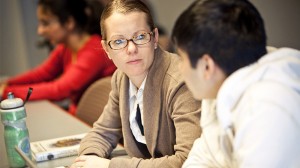Congruent with the Oct. 3 dedication of Gerri C. LeBow Hall, President John A. Fry announced the launch of Drexel University’s School of Economics in an email to students. Before the school’s establishment, the entity was labeled as the Department of Economics within the LeBow College of Business.
Vibhas Madan, who will serve as the school’s first director, shared the initial reason behind the institution’s commencement. “The main motivation, really, behind elevating the Department of Economics to a School of Economics is arguably to give it much more visibility in the academic marketplace and to raise its presence within the University,” he said.

Madan acknowledged that there are many benefits that come with being a school of economics, including the possibility of expanding course offerings, allowing them to attract more students, better students, and to have the potential of collaborating with industry partners. In addition, Madan said that being a school will provide them with additional opportunities to raise revenue, like selling naming rights for the school, which can be used to improve student education and to help broaden its programs.
“What we really want to do is to raise the profile and reputation of our economics faculty and students,” Linnehan said. “The Department of Economics has been recognized as one of the top research institutions in international trade and macroeconomics.”
Moreover, Linnehan expressed that the economics faculty here aren’t only great researchers but are also great teachers. He said he believed that with this great faculty, enrollment in the School of Economics would inevitably escalate. From 2012 to 2013, the economics department experienced a 23 percent increase in population, with the freshman class experiencing an increase of 67 percent. To add to the notion of making Drexel’s reputation in economic studies better, Madan pointed out that there is a correlation between all the top universities in the country and the quality of the economics program they carry.
On top of added opportunities, Madan laid out the program’s plans for future development, including improvement of its economics co-ops for students as well as setting up more experiences, through partnerships, for students with industry and consulting firms.
After the foundation of the School of Economics, the institution will roll out a Master of Science in economics next fall, increasing the pool of degrees offered through the school, including Bachelor of Arts, Bachelor of Science, and Doctor of Philosophy in economics, Linnehan said.
“With our new [Master of Science] program, we’re following a two-prong approach with a focus on business and policy,” Linnehan said. “It’s a program for people who are looking for jobs in economic policy and companies doing economical consulting or economic analysis, as well as providing preparation for students who want to enroll in a doctoral program in economics.”
Because the course of study for a master’s in economics will be less than two years, approximately five quarters, the program will offer an optional internship, rather than a co-op, that will be available to students during their latter stages of study.
Madan said he recognizes that there are not many master’s programs in economics, as it is an underserved market nationwide. Given that information, he said he envisions that the School of Economics will specialize itself in three areas of focus: national economics, macroeconomics and industrial organization. While deepening those three core areas on the research side, Madan’s vision also entails for the institution to become a center for collaborative research, eventually establishing research centers around campus.
Within a five-year timespan, Madan said he plans for the school to reach a steady state of 350 undergraduate economics majors, while Linnehan said he has optimistic intentions for the program to grow to 1,500 students a decade from now. From this, Linnehan would like to see the majority of these students later moving on to graduate schools for further economic study. Presently, there are only 10 students enrolled in Drexel’s doctoral program in economics.
“The big difference students will see from belonging to the School of Economics is going to be receiving their degree from a school of economics rather than an economics department — simply the recognition factor of being from an actual stronger identity of school is going to be helpful as a brand in the marketplace,” Madan said.
“At the end of the day, the success of the School of Economics is going to be the success of its graduates, and my objective and desire is to see the School of Economics produce high-quality worth of graduate students and enhance not just the program of the School of Economics but of Drexel University,” Madan said.


